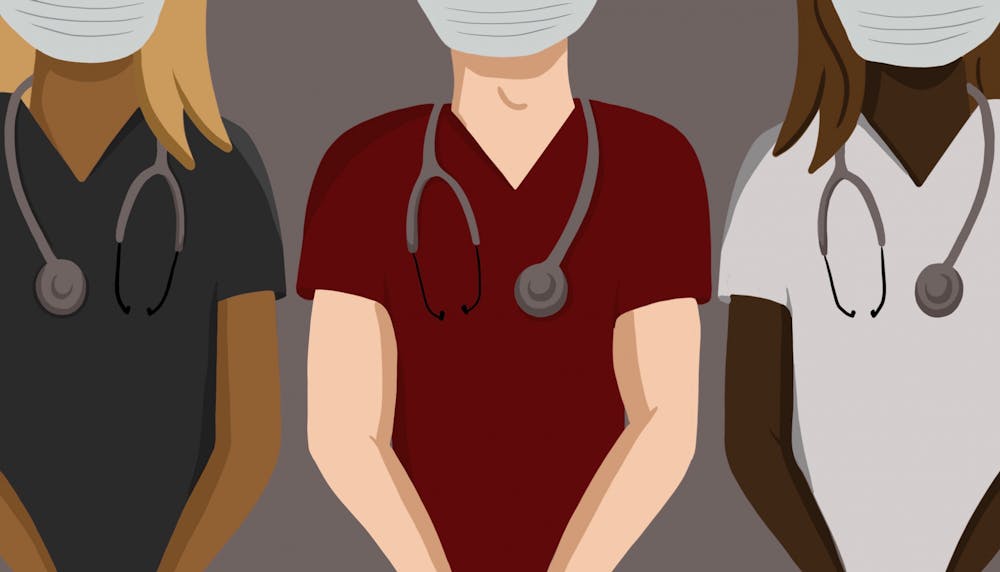Many USC nursing alumni are facing significant challenges while on the front lines of the COVID-19 pandemic. They have sacrificed their personal lives and their comfort to help save lives throughout the country.
"Being a frontline healthcare provider right now is incredibly isolating, as my direct contact with COVID-19 patients requires I be diligent with self-quarantining to keep my family and friends safe," Jessica Belden said in an email interview.
Belden, a registered nurse at VCU Medical Center in Richmond, Virginia, graduated from USC in May 2012. During the past few months, she has struggled with adapting to a new normal in her work life and personal life.
"The nurses and staff in my ER are a well-oiled machine; we think clinically and act quickly to give our critically ill patients the best chance of survival," Belden said. "COVID-19 has completely changed that process, and we've had to rethink our entire care model."
Nurse team lead Chelsea Headden has also gone through chaotic change as she recently switched roles from a nurse to a supervisor in February. She said it was a difficult transition because it's "doing nursing from a different perspective" along with the added stress of COVID-19.
Headden works with DHEC in the Lexington County Health Department. She graduated in 2018.
"Right now, I am going out, and I'm a part of a nurse team that is helping test residential communities. We're going to test in high-risk populations," Headden said.
Haley Griggs, a 2015 alumna, works at a local ER in Columbia as a registered nurse. Griggs has struggled with wearing personal protective equipment (PPE) while working in the hospital. There are no longer COVID-only zones now, but when there were, rules were restrictive.
"If you were the nurse assigned to this area you would be in full PPE for hours on end. Even small tasks like taking a sip of water or going to the restroom would take 10+ minutes because you would have to properly remove all your gear, leave the zone, put everything back on, and return," Griggs said in an email interview.
Despite the struggles they face, the nurses have had to push their problems aside and focus on their patients.
Belden has found the isolation required for patients and staff to be difficult. Usually she can comfort her patients and care for them, but now she isn't able to do that.
"As an ER nurse, I care for people when they are their most vulnerable; they're scared, feeling more uncertain and uneasy than they likely ever have before. I care for people on the worst days of their lives, and support from their loved ones is essential during this time," Belden said.
Belden said she is appreciative and proud of her peers for stepping up to spend extra time with their patients.
Griggs said the pandemic has highlighted nurses as patient advocates. Nurses are "the middle man" who keeps relatives informed since no visitors are allowed in the hospitals.
"During this pandemic, the nurses were the only ones there with the patients during their scariest moments," Griggs said.
Headden is thankful that she can continue her work and interact with her patients in the clinic during the pandemic.
"It just puts things in perspective. Obviously, everyone's lives have been changed by all of this," Headden said. "It's pretty neat to be a part of."
Headden believes the nursing program and her minor in public health are helping her through this pandemic because the programs are centered around preventive measures and getting ahead of outbreaks.
"I don't think I ever was going to be a part of something like this ... but I definitely think it definitely helped doing it from both angles, the public health and the nursing part," Headden said. "I don't think I'd be able to be the nurse or the supervisor that I am today without both these programs."
Belden said the USC nursing program has prepared her well for this pandemic. The program laid the foundation for her entire career and challenged her individually and in her career.
"My Capstone assignment in a small but very busy ER taught me early on how to be adaptable and flexible in my job, something this pandemic has required of everyone," Belden said.
The pandemic has almost been surreal to Griggs during the past few months as she has cared for patients.
"I work with nurses who have been Er nurses for 40 years and even they were shocked," Griggs said. "I think the usc program prepared me to be an excellent nurse however I don’t think anything could of prepared anyone for the pandemic the world has experienced."

